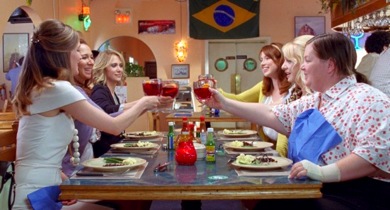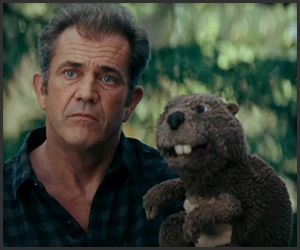The Tree of Life, the Universe, and Everything

Terrence Malick's The Tree of Life is only open in New York and LA, so it'll be a few more weeks before most people can spend 3 hours of their lives watching a non-linear, highly conceptual art film with hardly any dialogue about the dawn of the universe, the questionable existence of God, and a family in 1950's Waco, TX. The guys at Filmspotting wrote on Twitter, "Can I just call it the greatest movie ever and not see it, thus not spoiling the illusion?" It's a daunting movie with dangerously high expectations, but I loved it. Here are a few notable things, before I forget.
This is Malick's 5th movie, and if you've seen any of his other stuff, you know the story. Lingering shots of natural settings, gorgeous cinematography, whispered voice-overs that seem like audible subconsciousness. Light on plot and structure, heavy on mood and emotion.
But this one made me realize how much he relies on his actors to convey what's happening in a scene and with the story, often without letting them say anything. Most scenes don't have much action, but we learn something about each character through everything they do on screen.
This is especially true of Brad Pitt, who plays the father of the family at the center of the movie. I'm not a Brad Pitt fan, but he's great in this. It's not a likable character or a flashy role, and he has to embody internal conflicts and strange, seemingly contradictory aspects of his personality. A lot of the time I forgot I was watching a big star. Jessica Chastain is good as the loving, nurturing mother, but one of the movie's few flaws is that her character doesn't have much depth. She's all loving, all nurturing, all the time. She's the emotional core, and maybe her consistency as a source of goodness gives some answer to the question at the center of the movie.
Which is something like: Where is God, or are we alone in a meaningless universe? It's basically the same question the Coen Brothers ask in A Serious Man, but Terrence Malick asks it with wise-eyed children and dinosaurs instead of Jefferson Airplane and rabbis.
Malick really goes all out with the unconventional storytelling. We jump between 1950's Texas and a contemporary city (Houston?) where a morose Sean Penn, the oldest child in the family, wanders around his office building and appears to be completely untethered from his current reality. There's a long, unstructured visualization of the dawn of the universe, with spectacular, cosmic images of the natural world that are so overwhelmingly beautiful that they're sometimes hard to take.
A few months ago, I posted something about the movies that make you cry. This one's not only on my list, but I think it sets some personal record in terms of volume. I was a pathetic weeping mess. Which brings me to my main question about this movie: Is it just an expertly crafted tool of emotional manipulation? All those scenes of kids running around in fields glowing in the magic hour sun, playing kick the can and climbing trees: Malick really nails our collective American nostalgia for lost childhood. I experience something like cinematic patriotism watching it. It's uplifting and devastating at the same time.
Most of the heartstrings-pulling impact of the movie is sincere, but one or two moments toward the end, set in some mysterious communal time and place of reunification, veer toward emotional button-pushing. In general, it's admirably restrained and precisely controlled, so I can let some of the mushy stuff go.
One other thing: I don't know how Malick found the three young actors that play the boys, but he got some amazingly great performances out of them, and they carry some of the movie's best scenes. It's their first movie for all three.



